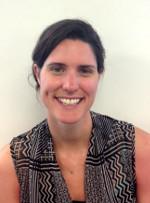-
About
- Departments & Offices
-
Academics
- Public Health
- Biomedical Sciences
- Physician Assistant
- Special Master’s (MBS)
-
Admissions & Financial Aid
- Tuition & Fees
-
Student Experience
-
- Student Resources by Program
- Academic & Student Support
- Wellness & Wellbeing
- Student Life
- Events & Traditions
-
-
Research
- Research Labs & Centers
- Tufts University-Tufts Medicine Research Enterprise
-
Local & Global Engagement
- Pathway & Enrichment Programs
- Global Health Programs
- Community Engagement
Our Alumni: Karen Ann Alroy
"By improving our knowledge of tissue recognition, deciphering self from non-self, this research had the potential to enhance our understanding of organ transplantation in people."

I am currently working as an emergency veterinarian at a high volume, 24 hour animal hospital. In this position I have been fortunate to gain an extensive amount of clinical experience in a short time frame. In the Fall of 2013 I will be transitioning from my clinical position to one more focused on policy and populations. I have been awarded a Science and Policy Fellowship with the American Association for the Advancement of Science (AAAS). This fellowship allows doctoral level clinicians and researchers to apply their technical knowledge in a branch of government. Fellows gain practical experience working at the intersection of science and policy at the federal level. My placement is at the National Science Foundation, and I will be working in the Dimensions of Biodiversity Program.
What inspired you to pursue a DVM/MPH?
After college, I worked for some time as a lab tech in a marine conservation genetics laboratory in California. Our lab studied the genetics of colonial tunicates, a type of marine invertebrate also known as a sea squirt. Specifically, we studied the genetics of how these organisms recognize self from non-self. As a tunicate colony expands and grows on the under side of a dock or marina, this simple organism is able to distinguish itself from another genetically distinct tunicate colony. There were many similarities in the genes we studied in tunicates to the genes that control self recognition in humans, and I was impressed by these connections. By improving our knowledge of tissue recognition, deciphering self from non-self, this research had the potential to enhance our understanding of organ transplantation in people. I was inspired by the possibility that by studying sea creatures we could gain insight into human health and medicine. This intersection of nature and medicine drew me to One Health: the joint study of human, animal, and environmental health. I immediately became fascinated by this burgeoning field. The diversity of One Health is incredible and it has many facets such as comparative anatomy and physiology, zoonotic disease, environmental conservation, all the way to international development and global health. Pursing a DVM/MPH was the best way to prepare for a career in One Health.
What drew you to the Tufts Program?
I was impressed by the Tufts joint DVM/MPH for several reasons. I was excited about the opportunity to learn about health on various scales: in my veterinary curriculum I could focus specifically on health, medicine and the pathophysiology of disease, whereas in the public health curriculum I could scale up and learn about health from a population and systems perspective. I appreciated that the program was fairly intensive and could be completed in four years. And lastly, I knew that Tufts was a leader in One Health and would prepare me well for my future career.
How did your Tufts degree help prepare you to work in the field, or what were the highlights of your program?
Through the DVM/MPH program, I was afforded incredible opportunities to work at the forefront of One Health: I conducted both domestic and international research, traveled overseas for conferences in biodiversity and health, and at the same time established a strong foundation in veterinary medicine and public health knowledge. Tufts has an extensive network of programs that focus on environmental conservation and public health, including the Public Health and Professional Degrees Program, the Center for Conservation Medicine, the Tufts Institute for the Environment, the Signature International Veterinary Medicine Program, and the Bernice Barbour Wildlife Clinic. I found great financial support in my endeavors, my faculty were highly encouraging, and I formed valuable professional connections.
What advice do you have for prospective students?
I recommend that prospective students try to identify their passion within the field of public health and then find people who are doing similar work. Connect with professors and students and find ways to get involved.